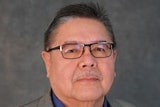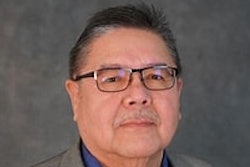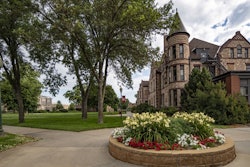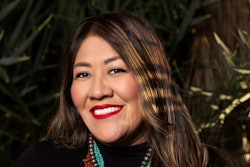WILLIAMSBURG, Va.
On May 13, 1607, three small English ships approached Jamestown Island in Virginia carrying about 100 men and boys. King James I had granted a group of London businessmen a charter to set up an English settlement in North America — ”the New World.” The company expected them to develop industries and return a profit for the settlement’s investors.
The settlement the group founded on the banks of what they called the James River would become known as Jamestown. Instead of finding gold and riches, the English met with hard living. The settlement stood on swampy, mosquito-infested land, and they became sick from the river’s salty water.
Without the help of the American Indians who gave them food, and later a group of West Africans, who provided labor to tend the growing tobacco fields, the settlement, which marked the beginning of the United States of America, would not have survived, said Karenne Wood, who serves on the Tribal Council of the Monacan Indian Nation and is the director of the Virginia Indian Heritage Program, and Dr. Cornel West, author of Race Matters and a professor of Religion at Princeton University.
This year’s marking of the 400th anniversary of the settlement at Jamestown gives America the chance to revisit and correct stories about the relationships between these three groups, the pillaging of American Indian villages, the enslavement of Africans and the impact these events continue to have in 2007, Wood, West and a group of seven other academics said Friday on the campus of the College of William and Mary, in Williamsburg, Va., about 10 miles from the original settlement. Talk show host and author Tavis Smiley convened the group as part of “State of the Black Union 2007,” an annual discussion he has held since 2000.
Most history textbooks site the arrival of a group of English settlers who arrived in 1620 to Plymouth County, Mass. aboard the Mayflower as the birth of the nation. The group, known as the Pilgrims, had fled England in search of religious freedom, and history books tell the stories of their friendship with American Indians marked by a Thanksgiving celebration.
“But before the Pilgrims, you had the Jamestown Africans,” Smiley said at the start of the discussion.
“If we go back to Jamestown, there is no cotton, there is no Deep South, there is no Christianity,” said Dr. Ira Berlin, a professor at the University of Maryland. “There are different people from different nations. It is a very poor and open society.”
Berlin also noted that most of the 100 English settlers were “caught up in indentured servitude.” The settlers were there to provide a profit for the Virginia Company of London, which gave them clothing and food with the expectation that they develop businesses that would profit the shareholders. As indentured servants, the early colonists were to work for seven to 10 years in exchange for passage, food, protection and land ownership.
“The most important thing to focus on is to acknowledge that this is the age of empire,” said West, who referred to 17th century Britain as a “third-rate” world power that was trying to catch up with the Spanish empire. “Spain had already colonized much of the New World,” West noted.
“It is important to understand that English America was a corporation before it was a country,” he said.
As such, the English colonists tried many industries, including silk, wheat, glass, timber and cotton, but none of the exports proved profitable enough to sustain the colony. That changed in 1612, when colonist John Rolfe developed a smooth-tasting tobacco leaf that was easy to cultivate.
As the market for “New World” tobacco grew, the colonists began demanding more land from American Indians, leading to increased conflict between the groups. They also needed workers.
In 1620, pirates stole Angolan war captives from a Portuguese ship and brought about 20 of them to Jamestown. In order for the colony to survive, it needed the skills and the labor that these Africans — who hailed from a kingdom of farmers, craftsmen and cattle herders — brought with them.
“The Africans arrived with skills,” said Dr. Darlene Clark Hine, a professor of African-American studies and history at Northwestern University. “These were not a bunch of hapless primitive people that Europeans had to train. They came over with tools and resources in hand.”
African immigrants initially weren’t slaves for life. Some were free and some worked as indentured servants alongside the English indentured servants, planting and harvesting tobacco, raising cattle and trading produce to American Indian and European settlers, Berlin said.
During the early years of the settlement, many Black people were free, owned property and were full participants in society. Things changed, Berlin said, with the creation of a new institution — the plantation.
“The planter class came to dominate society,” he said.
It took time for Africans to evolve into slaves, said panelists Hine and Dr. Farah J. Griffin, a professor of English and comparative literature at Columbia University. African labor became critical to the growth and management of the tobacco farms.
It was then that colonists instituted laws to maintain a continual supply of this labor force.
“It was not until much later that you get laws that made children the possession of their owners,” Griffin said.
“Any child born of a slave woman would be a slave for life because the child would inherit the status of the mother, and that was a departure from English law,” added Hine.
The development of lifelong slavery was driven by the economic interests of the British, who were eager to make a profit from New World tobacco.
In the 1640s, the colony saw the emergence of limitations on rights of people categorized as Negro, said Dr. Cassandra Newby-Alexander, a professor at Norfolk University. “It was a way to create a class system based first upon racial identification and then on economics. That is why Plymouth has been catapulted to the beginning of our nation and not Jamestown,” she said.
The English emphasis on converting American Indians and Africans to Christianity also had an impact on their ability to maintain their labor force, West noted.
Such laws and restrictions then began to affect the motivation of Africans and their descendents, said Rex Ellis, vice president of the historic area at Colonial Williamsburg.
“As we move through the period of time, it begins to affect our concept of work,” Ellis said. “We begin to think about work as something for others as opposed to something we do for ourselves. It is not the quality of the work, it is ‘how I can do less because it is the only way I can rebel,’” Ellis said. “Much of that legacy is still with us.”
Panelists called on the development of new narratives to fully tell the story of America and acknowledgement of the key roles American Indians and Africans had in the country’s birth and its principles of democracy, free enterprise and representative government.
“Our society is very good at promoting an image. I hope we will begin to look at the realities of our past, not what we want to see, but what existed,” Newby-Alexander said.
“We have to dispel the myth that during the transatlantic slave journey Africans lost their culture,” said Eddie Glaude, an associate professor of Religion and African Americans studies at Princeton University.
“We are all saying we want our stories told and that means we create a new story,” Hine said.
“I’m concerned with the truth,” West said. “If I hear a master narrative and it’s not the truth, then somebody is lying.”
–Cassie M. Chew
There are currently 4 comments on this story.
Click here to post a comment.
© Copyright 2005 by DiverseEducation.com















